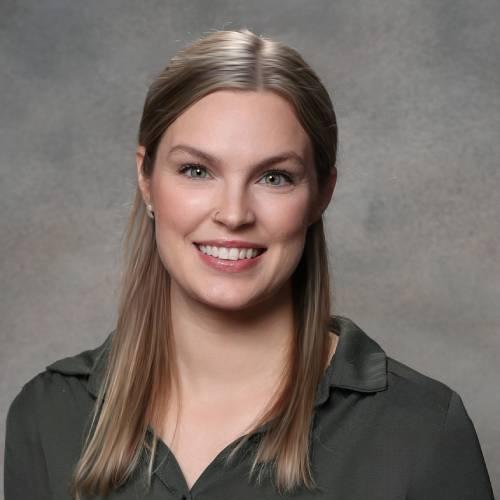Nov 20, 2025
Duppen driven to improve mobility and independence for people with Parkinson’s

When Chelsea “CJ” Duppen PT, DPT, PhD began treating patients in rural North Carolina, she was one of only two clinicians in her county trained to handle neurologic diagnoses.
“Because of that, I was treating a lot of people with Parkinson’s disease.” she said. Working so closely with them completely changed her outlook. “There’s no cure for Parkinson’s, and people often understand early on how the disease may affect their lives,” she said. “As a clinician, you care for them from the time they’re diagnosed all the way through end-of-life, and you build strong relationships with them and with their families.”
Experiencing that firsthand pushed her to ask bigger questions. “I started getting really frustrated with how little we know about Parkinson’s and how to treat it,” Duppen said. “I talked to my patients about it, and they encouraged me to go back and get my Ph.D., which is how I ended up here.”
Duppen joined the VCU Department of Physical Therapy, part of the College of Health Professions, in December 2024. She earned her undergraduate and doctoral degrees from the University of North Carolina at Chapel Hill.
Today, her research focuses on improving mobility and independence for people with Parkinson’s disease. She was drawn to VCU, in part, because of its interdisciplinary Parkinson’s and Movement Disorders Center (PMDC), one of only 47 research and treatment facilities worldwide designated as a Parkinson’s Foundation Center of Excellence. In Virginia, the PMDC is the only one holding the elite designation.
“I saw an opportunity to partner with numerous experts who are also researching how to improve clinical care for people with Parkinson’s,” she said. “It’s an ideal fit.”
Looking from the Outside In
Much of Duppen’s research reframes how the field thinks about movement. “We tend to think about Parkinson’s as a top-down problem,” she said, meaning that changes in the brain are assumed to be the main cause of movement difficulties. But that model, she noted, doesn’t tell the whole story. “We can stimulate the areas of the brain that are affected and replace the chemicals people are missing, but that still doesn’t address all the symptoms,” she said. “So instead of looking only from the top down, my research looks from the outside in—specifically, how the ways people interact with their environment influence their mobility.”
Duppen is currently studying how different senses contribute to movement difficulties. She is investigating how the body processes visual information, signals from the inner ear that help with balance, and proprioception, which is your body’s ability to sense the position and movement of your limbs in space.
“There’s a well-known challenge in Parkinson’s where people have difficulty processing sensory information,” she said. “My work focuses on figuring out which sensory system is most affected for different activities, and developing ways to improve it.”
Taking the First Step
Her clinical observations also shaped her academic curiosity, as she worked with her patients on improving mobility. “All these treatments help my walking,” she recalled them saying, “but I have trouble taking that first step.”
That insight became the foundation of her doctoral dissertation on gait initiation. “We do a lot to improve walking for people with Parkinson’s, but if they can’t initiate the first step, they can’t benefit from those treatments,” she said.
While many rehabilitation studies focus on walking speed and endurance, Duppen now studies the less-explored aspects of mobility, such as turning or standing up from a chair, which are movements that often trigger freezing of gait, which is a phenomenon many people with Parkinson’s disease face that has been described as feeling as though one’s feet are ‘glued to the floor’, despite trying to move.
Currently setting up her VCU lab in the College of Health Professions, Duppen will use motion capture, force plates and other specialized tools to isolate and test different sensory systems. That includes noninvasive brain stimulation to investigate the vestibular system, an inner-ear component that contributes to balance and spatial awareness.
As she continues to settle in, she’s also working with VCU neurologist Leslie Cloud, MD, MSc, and colleague Pete Pidcoe, PT, DPT, PhD, professor and director of the Engineering and Biomechanics Lab, on a big-data project using the Parkinson’s Progression Markers Initiative dataset. “We’re working on finding a way to predict when someone is going to lose the ability to walk,” she said. “This way we can either intervene before that happens to keep them walking longer, or set them up for success with the transition.”
In the classroom, Duppen helps students connect neuroscience to patient care. She co-teaches Functional Neuroanatomy with Thomas Mayhew, PT, PhD, FAPTA, and Neurological Physical Therapy with Alicia Flach PT, DPT, EdD . While the first course focuses on how things work, the second delves into “what happens when those areas don’t quite work the way they should.”
When asked what she ultimately hopes her research will achieve, Duppen doesn’t hesitate: “I want to help people with Parkinson’s stay independent for as long as possible,” she said.
That goal ties together everything Duppen does, from her lab work to her research collaborations to her teaching. “My hope is that we find a cure for Parkinson’s disease and no longer need what I do,” she said. “But until then, I’m focused on improving the lives of people who are living with the disease right now.”